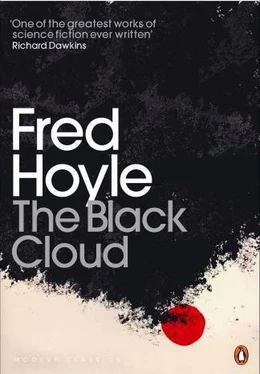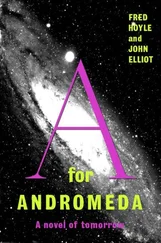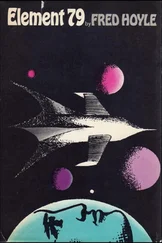Fred Hoyle - The Black Cloud
Здесь есть возможность читать онлайн «Fred Hoyle - The Black Cloud» весь текст электронной книги совершенно бесплатно (целиком полную версию без сокращений). В некоторых случаях можно слушать аудио, скачать через торрент в формате fb2 и присутствует краткое содержание. Жанр: Фантастика и фэнтези, на английском языке. Описание произведения, (предисловие) а так же отзывы посетителей доступны на портале библиотеки ЛибКат.
- Название:The Black Cloud
- Автор:
- Жанр:
- Год:неизвестен
- ISBN:нет данных
- Рейтинг книги:5 / 5. Голосов: 1
-
Избранное:Добавить в избранное
- Отзывы:
-
Ваша оценка:
- 100
- 1
- 2
- 3
- 4
- 5
The Black Cloud: краткое содержание, описание и аннотация
Предлагаем к чтению аннотацию, описание, краткое содержание или предисловие (зависит от того, что написал сам автор книги «The Black Cloud»). Если вы не нашли необходимую информацию о книге — напишите в комментариях, мы постараемся отыскать её.
The Black Cloud — читать онлайн бесплатно полную книгу (весь текст) целиком
Ниже представлен текст книги, разбитый по страницам. Система сохранения места последней прочитанной страницы, позволяет с удобством читать онлайн бесплатно книгу «The Black Cloud», без необходимости каждый раз заново искать на чём Вы остановились. Поставьте закладку, и сможете в любой момент перейти на страницу, на которой закончили чтение.
Интервал:
Закладка:
“If we could get the velocity of the cloud, then we should know how big it is and how far away,” remarked Weichart.
“Yes, I’ve been thinking about that,” went on Marlowe. “The Australian radio boys could get the information for us. It’s very likely that the cloud consists mainly of hydrogen, and it should be possible to get a Doppler shift on the 21 cm line.”
“That’s a very good point,” said Barnett. “The obvious man is Leicester in Sydney. We ought to get a cable off to him right away.”
“I don’t think that’s quite our job, Bill,” Herrick explained. “Let’s stick to what we can do ourselves. When we’ve sent in our report, it’ll be Washington’s job to contact the Australians about radio measurements.”
“But surely we ought to make a recommendation about getting Leicester’s group on to the problem?”
“Certainly we can do that, and I think we ought to. What I meant was that we ought not to initiate action of this sort. The whole business is likely to have serious political implications, and I feel that we ought to keep away from such things.”
“Right enough,” broke in Marlowe; ‘politics is the last thing I want to get involved in. But obviously we need the radio boys to get the velocity. The mass of the cloud is more difficult. As far as I can see the best way, perhaps the only way, would be from planetary perturbations.”
“That’s pretty archaic stuff, isn’t it?’ asked Barnett. “Who do it? The British, I suppose.”
“Yes, h’m,” murmured Herrick, “perhaps we’d better not emphasize that aspect of the matter. But the Astronomer Royal probably would be the best person to approach. I’ll make a point of it in the report, which I ought to start on as soon as possible. I think we’re agreed on the main points. Does anyone want to bring up anything further?”
“No, we’ve gone over the ground pretty thoroughly, as far as we can go, that’s to say,” answered Marlowe. “I think I’ll be getting back to one or two jobs that I’ve rather neglected during the last few days. I expect you’ll want to get that report finished. Glad I don’t have to write it.”
And so they filed out of Herrick’s office, leaving him to get down to his writing, which he did forthwith. Barnett and Weichart drove back to Caltech. Marlowe went to his own office. But he found it impossible to work, so he strolled along to the library where there were several of his colleagues. A lively conversation of the colour-magnitude diagram of the stars of the galactic nucleus contrived to pass the time until it was generally agreed that the lunch hour had arrived.
When Marlowe returned from lunch the Secretary sought him out. “Cablegram for you, Dr Marlowe.”
The words on the piece of paper seemed to swell to a gigantic size:
PLEASE INFORM WHETHER UNUSUAL OBJECT EXISTS AT RIGHT ASCENSION FIVE HOURS FORTY-SIX MINUTES, DECLINATION MINUS THIRTY DEGREES TWELVE MINUTES. MASS OF OBJECT TWO-THIRDS JUPITER, VELOCITY SEVENTY KILOMETRES PER SECOND DIRECTLY TOWARDS EARTH. HELIOCENTRIC DISTANCE 21.3 ASTRONOMICAL UNITS.
With a startled cry Marlowe raced along to Herrick’s office, and burst in without the formality of a knock.
“I’ve got it here,” he shouted. “All the things we wanted to know.”
Herrick studied the cablegram. Then he smiled somewhat wryly and said:
“This alters things quite a bit. It looks as though we shall have to consult with Kingsley and the Astronomer Royal.”
Marlowe was still excited.
“It’s easy to diagnose the situation. The Astronomer Royal has supplied observational material on the planetary motions and Kingsley has done the calculations. If I know those two fellows there isn’t much chance of a mistake there.”
“Well, it’s easy enough to do a quick check. If the object is 21.3 astronomical units distant and it’s moving towards us at seventy kilometres per second, then we can soon work out how long it should take to reach us, and we can compare the answer with Weichart’s estimate of about eighteen months.”
“Right you are,” said Marlowe. He then jotted the following remarks and figures on a sheet of paper:
Distance 21.3 astr. units = 3 × 1014 cm approximately.
Time required to travel this distance at a speed of 70 km per sec.

“Perfect agreement,” exclaimed Marlowe. “And what’s more, the position they give is almost dead on our position. It all fits together.”
“This makes my report a much more difficult matter,” Herrick said with a frown. “It really should be written in consultation with the Astronomer Royal. I think we ought to get both him and Kingsley over here as soon as possible.”
“Absolutely right,” agreed Marlowe. “Get the Secretary on to it right away. It should be possible to get ’em over in about thirty-six hours, the morning after tomorrow. Better still, let your friends in Washington make the arrangements. And about the report, wouldn’t it be a good idea to write it in three parts? Part one could deal with our discoveries here at the Observatory. Part two would be contributed by Kingsley and the Astronomer Royal. And part three would be an account of our conclusions, especially the conclusions we reach when the British get here.”
“There’s a great deal in what you say, Geoff. I can get part one finished by the time our friends arrive. We can leave part two to them, and lastly we can thrash out our conclusions.”
“Excellent. I reckon you’ll probably get through by tomorrow. How about bringing Alison over for dinner tomorrow night?”
“I’d be glad to, delighted to, if I can get through by tomorrow afternoon. Can I leave it until then?”
“Sure, that’s fine. Just let me know tomorrow,” said Marlowe getting up.
As Marlowe was leaving, Herrick said:
“It’s pretty serious, isn’t it?”
“It certainly is. I had a sort of premonition when I first saw Knut Jensen’s pictures. I didn’t realize how bad it was until this cable arrived. The density works out in the region of 10–9 to 10–10gm. per cm3. That means it’ll block out the Sun’s light entirely.”
Kingsley and the Astronomer Royal arrived in Los Angeles early on the morning of 20 January. Marlowe was waiting to meet them at the airport. After a quick breakfast in a drug store they hit the freeway system to Pasadena.
“Goodness me, what a difference from Cambridge,” grunted Kingsley. “Sixty miles an hour instead of fifteen, blue skies instead of endless rain and drizzle, temperature in the sixties even as early in the day as this.”
He was very weary after the long flight, first across the Atlantic, then a few hours’ waiting in New York — too short to be able to do anything interesting, yet long enough to be tiresome, the epitome of air travel, and lastly the trip across the U.S.A. during the night. Still it was a great deal better than a year at sea getting round the Horn, which is what men had to do a century ago. He would have liked a long sleep, but if the Astronomer Royal was willing to go straight to the Observatory, he supposed he ought to go along too.
After Kingsley and the Astronomer Royal had been introduced to those members of the Observatory that they had not previously met, and after greetings with old friends, the meeting started in the library. With the addition of the British visitors it was the same company that had met to discuss Jensen’s discovery the previous week.
Marlowe gave a succinct account of this discovery, of his own observations, and of Weichart’s argument and startling conclusion.
“And so you see,” he concluded, “why we were so interested to receive your cablegram.”
Читать дальшеИнтервал:
Закладка:
Похожие книги на «The Black Cloud»
Представляем Вашему вниманию похожие книги на «The Black Cloud» списком для выбора. Мы отобрали схожую по названию и смыслу литературу в надежде предоставить читателям больше вариантов отыскать новые, интересные, ещё непрочитанные произведения.
Обсуждение, отзывы о книге «The Black Cloud» и просто собственные мнения читателей. Оставьте ваши комментарии, напишите, что Вы думаете о произведении, его смысле или главных героях. Укажите что конкретно понравилось, а что нет, и почему Вы так считаете.












